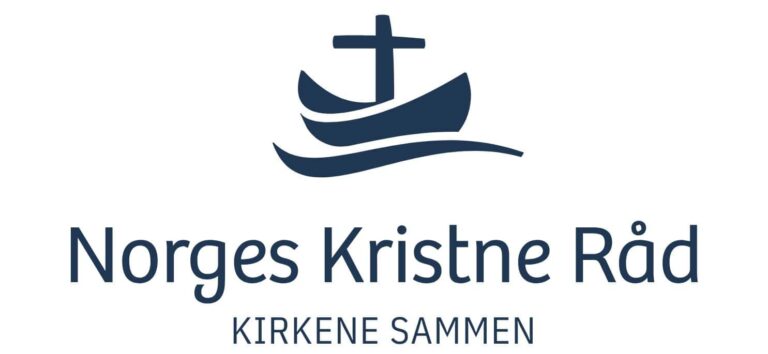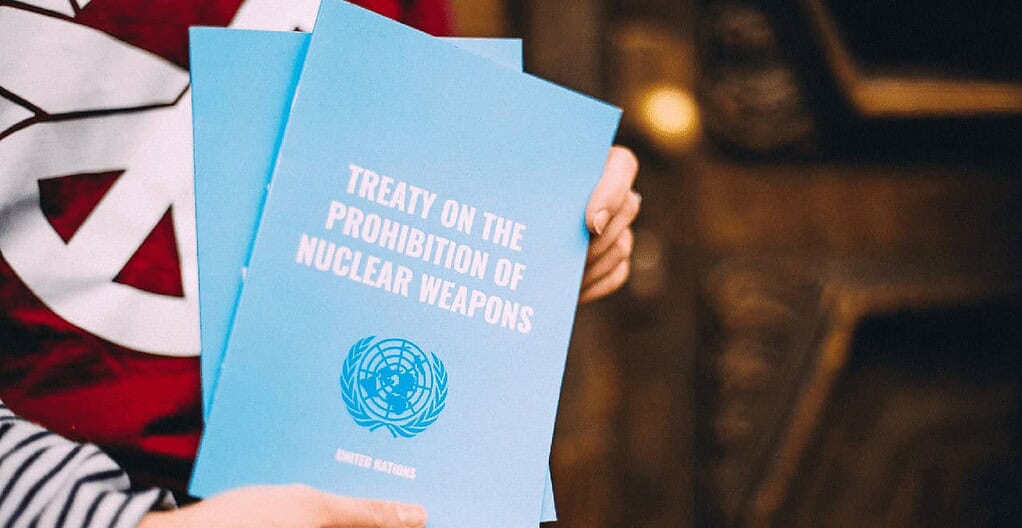Under den første dagen av statspartsmøtet til FNs atomvåpenforbud i går, holdt Parlamentarikere for Traktaten om forbud mot kjernevåpen (TPNW), et nettverk av parlamentarikere til støtte for traktaten, en konferanse i FN i New York. Her ble det overgitt en felles interreligiøs erklæring – signert av 115 trosbaserte aktører og organisasjoner verden over, deriblant Norges Kristne Råd. Det blir ikke blir sann sikkerhet, trygghet og fred for noen av oss før det er trygghet, sikkerhet og fred for oss alle.
Erklæringen:
We gather as people of faith – religious leaders, practitioners, believers of many different traditions – to
affirm with one voice our opposition to nuclear weapons and our absolute belief that a world without
nuclear weapons is not only possible but that a nuclear-free future is already being made.
We take great joy in the existence of the Treaty on the Prohibition of Nuclear Weapons (TPNW) and take
this occasion of the Second Meeting of States Parties to celebrate how the TPNW and its supporters
worldwide have found the courage, determination and imagination to work for a world of justice and
equality.
We live on a beautiful planet with the splendor of forests, mountains, rivers and oceans that we share with
other creatures. Yet this planet and all who dwell here are threatened by the terror of nuclear weapons. It
is our responsibility as people of faith to redirect the moral outrage of the world towards the re-making of
that which is good. In this light, we celebrate the recognition of the human right to a clean, healthy, and
sustainable environment by the UN General Assembly last year, and send our prayers for successful
outcomes of COP28, which also starts during the same week as this meeting.
We honor the ancestors who have gone before us – the global hibakusha who suffered the horrors of
nuclear weapons testing and use as well as the generations of diplomats, religious leaders, activists,
researchers, artists and advocates – who dedicated their lives to making the world a safer place. Being
together in this moment, with this landmark piece of international law and with the determination to
universalize it, we know that this is only possible because of the work that went before us. At the same
time, we are encouraged by the surge in a new generation of young leaders who have the courage,
brilliance and hope to carry this work forward into the future. We work with integrity and unfailing
determination because we owe so much to both the past and the future.
Our religious traditions are vast and represent many millions of people, each trying to pursue lives of
meaning and goodness in a world that has never felt more threatened with catastrophe. Our faith that
humanity is meant for peace, wellness, joy and love remains unwavering even as we see with clarity the
devastation of the planet and our fellow human beings who are threatened globally by the double violence
of climate catastrophe and rampant militarism. Nuclear weapons represent the worst of both of those
threats – an evil unleashed upon this beloved planet with the power to wipe out everything that we hold
most dear – our water, our air, our land, and each other.
Even as we call on all States to join the TPNW, we take seriously our role as faith communities to
denounce nuclear deterrence as a false ideology which violates our most sacred commitments. We not
only decry any use of nuclear weapons, we oppose wholeheartedly the preparations for and threats to use
nuclear weapons as immoral. We urge States Parties at this meeting to move forward with practical
commitments to provide victim assistance and environmental remediation under Articles 6 and 7 of the
treaty. We commit to doing our part to care for those members of our community who have suffered the
direct impacts of nuclear weapons and to act as good stewards to remediate the land and waters which
have been harmed.
We celebrate the inclusivity of the TPNW with its attention towards the intersectional harms of nuclear
weapons. Our faith communities take seriously our unique commitments to the Indigenous peoples who
have been most affected by these weapons of utter destruction. As our faiths direct us to exercise special
love and care for the people who are most marginalized, we recognize in the treaty a meaningful avenue
to addressing the violence of the past and committing to a more just future.
As diplomats, policy makers, advocates and activists gather in New York City this week, we know their
work is supported by a much larger circle of people around the world who believe that another world
without nuclear weapons is possible and who will continue to work, write, march, pray, chant, meditate
and speak that new world into being. Nuclear weapons can never provide nourishment for our bodies,
courage for our hearts, creativity for our minds or inspiration for our souls. Nuclear weapons can only
annihilate, threaten and destroy everything that gives our lives meaning. Nuclear weapons drain financial
resources away from addressing poverty, racism, illness and premature death. And yet, we remain
resilient and vibrant in the face of their obliteration, refusing to let nuclear ideology also steal our hope,
our vision and our boldness in demanding justice and a right to live in peace for all people.
There is so much work to be done. We commit, as people of faith, to working to address the roots of
violence in our own religious traditions that have justified nuclear violence or that have chosen to ignore
the greed and aggression that undergirds nuclear ideology. We can and will weave together a deepening of
inner contemplation and reckoning that strengthens us to confront and survive threats to our collective
security. We know that there is no true safety, security and peace for any of us until there is safety,
security and peace for all of us.
We recognize the urgency of this moment and what is at stake for all of us – the beloved natural world
and the beloved community of humanity. Our fates are intertwined and we cannot ignore the resounding
threats that confront us. We feel acute fear and anxiety as an ever-present menace as we contemplate our
shared future. This fear is not unique to this moment in time. Let us draw courage from the audacity and
vision of past struggles for justice, taking comfort in the wisdom that immense challenges always feel
impossible until they are done.



